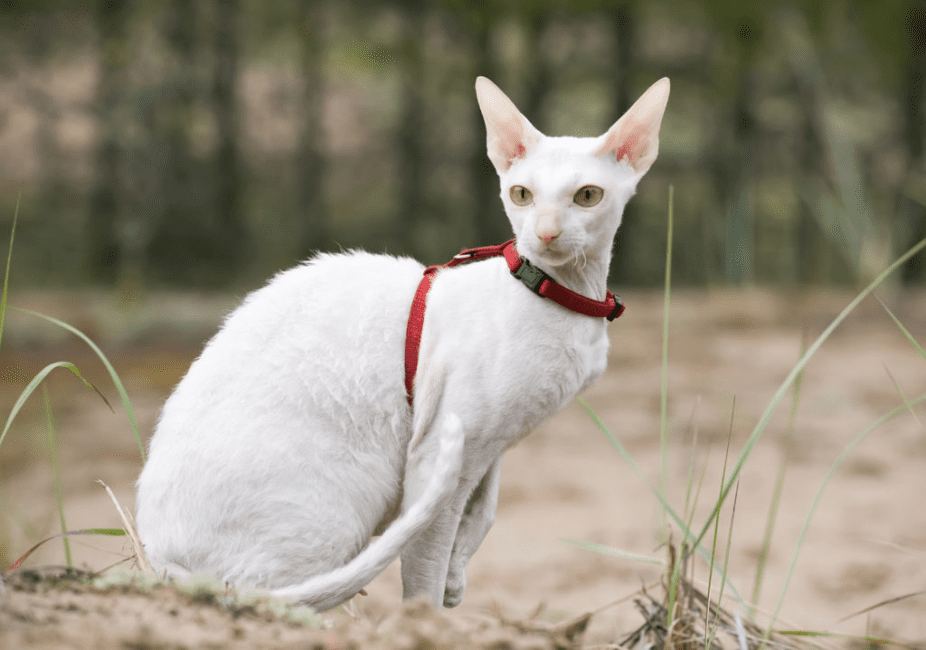A natural breed related to the Devon Rex, which is the Cornish Rex (Felis catus) is actually a fantastic genetic mutation. In the 1950s, a cat named Kallibunker was born in Cornwall, England, and had an incredible coat of the finest and curliest fur.
The first Cornish Rex, nicknamed Kalli, was bred successfully with Siamese, Burmese, British Shorthairs, and other breeds to successfully generate a robust, healthy breed known for its outgoing temperament.
The Cornish Rex has a silky and soft coat similar to the Sphynx, however, it is considerably more noticeable than the Sphynx’s fur. The Cornish Rex is currently one of the most popular cat breeds in America.
The Cornish rex enjoys playing and is difficult to outsmart since he is cunning, acrobatic, and clownish. He likes to play catch and can keep himself entertained for a long time. Even without a partner, he has been shown throwing and catching toys with his paws to amuse himself.
The Cornish rex cat makes a wonderful therapy cat because of his adaptability and love of cuddling. He gets along well with both kids and other animals.
The head of the Cornish Rex cat is short and narrow, with huge ears and eyes that appear large in relation to the head’s size. He has long, slim legs, a firm chin, and a Roman nose. The tail is also long and lean, and it is very flexible.
Cats with unusual coats include the Cornish Rex. Although it is smooth and delicate, it naturally produces waves that resemble rows of corn.
The Cornish Rex cat needs to spend time with its parent each day, as it loves being close next to them. Many Cornish Rex cats will go to any lengths to spend time with their parents. They enjoy being handled by their parents in general.
Being an active cat, the Cornish Rex will maintain its appropriate weight if given enough room to exercise.
The agile Cornish Rex cat enjoys jumping, running, and playing.
The few documented health problems in the extremely hardy breed of cat known as the Cornish Rex are:
▪ A type of heart illness called hypertrophic cardiomyopathy
▪ Patellar luxation
▪ Sunburns brought on by a lack of hair
With a Lifespan of 11 to 15 years on average
Read Also: Complete List of Different Types of Cat Breeds
Cornish Rex Car Breed (Felis catus) Grooming Guide

The Cornish Rex is a social, energetic breed that makes a great family pet. Basic necessities for your cat should include food, water, and a litter box. It’s quite playful, so make sure you play with it a lot and provide it with toys that are engaging.
The thin coat of the Cornish Rex makes it necessary for your cat to wear a sweater in the winter and cat-safe sunscreen in the summer.
To keep it healthy, have it immunized and visit the vet at least once a year. Although it requires little care, you should give it a regular hand brushing, examine and clean its ears, and brush its teeth.
▪ Brush your Cornish Rex cat; it won’t need much maintenance due to its short, wavy coat. In essence, very intense or frequent brushing might harm the coat. All that is required to groom your Cornish Rex’s coat is the motion of your hand when you pet it.
▪ Clean the ears of your cat: Since a Cornish Rex has big ears, you should frequently inspect them. Every week, check the inside of the animal’s ears for mites, discharge, or discomfort and smell for any unpleasant odors that can point to an infection.
Read Also: Hypoallergenic Cats Description and Complete Care Guide
Use a cotton ball to clean the cat’s external ear if there is excessive wax buildup there. Keep your fingers out of its ear canal. Take your cat to the veterinarian if the ear is red, smells terrible, or if it keeps itching.
▪ Cleaning your cat’s teeth: Even though they may dislike having their teeth cleaned, oral cleanliness is crucial for preserving your cat’s health.
Gently rubbing the area surrounding your cat’s mouth while you hold or pet it will help it become used to having its teeth touched. The ideal is daily brushing, but even once-a-week cleaning is preferable to nothing.
▪ To prepare your cat for having its nails trimmed, gently pet and massage its paws. Hold the paw and check inside the nail for the quick, which resembles a tiny pink triangle. To trim the nail, use a sharp pair of cat nail clippers. Be careful to cut only the tip of the nail and avoid the quick.
▪ However, each cat is unique, thus not all cats require bathing. Some cats need to take a bath every week, while others only need one every few months.
In either case, you should begin teaching your Cornish Rex to tolerate bathing at around 16 weeks. The Cornish’s short, thin coat dries fast, making bathing less of a problem than it is for regular cats.
Since Cornish rex breeds are hypoallergenic, people who are allergic to cats may find it easier to tolerate them.
Cornish Rex kittens are cute, lovely cats who stand out for their unique physical traits and lovable personality. Despite the fact that they seem charming and have unusual coats, you will fall in love with them for their genuine joy and affection.
One of the most popular breeds of a kitten is the Cornish Rex, which is known for its sweetness, gentleness, and ease of handling. They are incredibly intelligent and like to engage with their human friends. To keep it from getting lonely and getting into trouble elsewhere, your Cornish Rex kitten will need your continual care.
You should have access to cat trees, and because they like to climb, you should be cautious about the shelves you place things on. Your Cornish Rex kitten will develop when given a friend, so if you have any doubts about your abilities to care for them, remember this.
You must give your Cornish Rex kittens plenty of opportunities for play and socialization when it comes to growing them. They depend on you to keep them occupied for the majority of the day because they could get bored if they don’t receive enough play and exercise.
In conclusion, the perfect pet is a Cornish Rex kitten. Because they are so loving and caring toward their families, they make wonderful companions. If you give your pet a healthy diet, regular playing, and unfailing love and care, they can live a long and happy life. These kitties will capture your heart as well as your attention.
Read Also: How Long do Cats Live and the Different Types of Cats
Read Also: How to Start an Urban Farm

